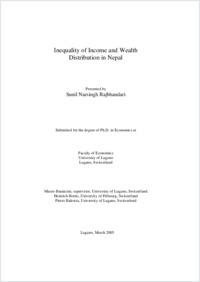Inequality of income and wealth in Nepal
- Rajbhandari, Sunil Narsingh
- Baranzini, Mauro (Degree supervisor)
- Bortis, Heinrich (Degree committee member)
- Balestra, Pietro (Degree committee member)
-
09.03.2005
292 p
Thèse de doctorat: Università della Svizzera italiana, 2005 (jury note: magna cum laude)
English
This dissertation focuses on the economic inequality problem in Nepal, in particular, to integrate insights from other social aspects into the distribution problems of economic resources. It consists of five chapters on income and wealth distribution in Nepal. The first Chapter presents an overview of Nepal’s history, geography, economic development, policies and problems. The aim of Chapter Two is to provide an understanding of the inequality of income for 1984 and 1996 in Nepal and to describe how income/expenditure inequality in Nepal has changed during the period 1984 and 1996. In Chapter Three we examine the inequality of wealth distribution for 1995 and 1996 in Nepal. The Chapter four continues to investigate income and wealth inequalities using decomposition methods because they provide rigorous and powerful tools for identifying the underlying structure of income or wealth, which allow for direct interpretation of the estimated contribution in terms of the inequality index – the relative contribution of a set of population characteristics and of each income factor source that may be found within household income, expenditure and wealth. Chapter Five investigates the inequality of income in the process of development in Nepal. We first examine the Kuznets’ proposition according to which ‘the degree of inequality varies systematically with the level of income per head – initially increasing as incomes rise and then, beyond some point, decreasing, with further increases in income per head’. By considering historical, structural, institutional, political and socioeconomic issues, we offer an alternative explanation of reducing economic inequality in Nepal, with an emphasis on economic development.
- Language
-
- English
- Classification
- Economics
- License
-
License undefined
- Identifiers
-
- RERO DOC 5697
- URN urn:nbn:ch:rero-006-108490
- ARK ark:/12658/srd1318111
- Persistent URL
- https://n2t.net/ark:/12658/srd1318111
Statistics
Document views: 393
File downloads:
- Texte intégral: 1045
